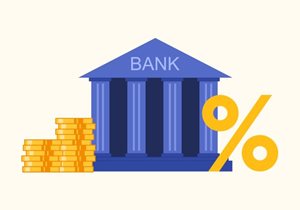Interest rate fluctuations can send ripple effects throughout the economy. The Federal Reserve increased its federal funds interest rate seven times in 2022, as consumer goods prices continued to rise throughout the year.
What are interest rates?
Interest rates are the expense associated with borrowing money. The Federal Reserve has the most influence over interest rates. They set benchmark interest rates that banks charge to lend and borrow money. This does not mean the benchmark rate is the rate you pay when you borrow money. There are many other factors at play that determine the interest rate you pay, like your credit history, credit score and debt to income ratio.
Why are interest rates rising
The central bank hopes that by raising interest rates, it can slow down the economy enough to moderate price growth. In essence, higher interest rates reduce economic activity and expansion, which curbs demand and promotes saving.
What makes interest rates rise
When you get a loan from a financial institution, an interest rate is attached to that loan. Banks need to borrow money, too. To do this they look to the Federal Reserve (America's central bank). Its primary role is to provide a safe and reliable financial system for the U.S. by maintaining deposit accounts for banks.
 As with any loan, the banks are charged an interest rate for borrowing money. It is this percentage, known as the federal funds rate, that the Federal Reserve helps set with its interest rate announcements. Banks pass on the cost of a higher federal funds rate to their customers when those customers want to access regular lending products.
As with any loan, the banks are charged an interest rate for borrowing money. It is this percentage, known as the federal funds rate, that the Federal Reserve helps set with its interest rate announcements. Banks pass on the cost of a higher federal funds rate to their customers when those customers want to access regular lending products.
It is important to note that interest rates on savings products, like savings accounts, certificates of deposit (CDs), and fixed-income securities, also rise. This encourages people to save more money, which also helps to slow down spending.
How do raising interest rates affect the economy
A higher interest rate discourages people from borrowing money or carrying a balance on a credit card because it will cost them more. The result is people purchase fewer goods, leading to less demand. This, in turn, slows down business growth, share prices, the cost of everyday goods, and the economy as a whole. There is a risk, however. Economists warn the combination of higher borrowing costs, high inflation, and slower growth could tip the U.S. economy into a recession.
Bottom line
When interest rates are lowered:
- Lower interest rates on savings accounts and CDs
- Commodity prices rise
- Bond prices rise
- Potential stock market gains
- Mortgage rates fall
When interest rates rise:
- Higher interest rates on savings accounts and CDs
- Commodity prices fall
- Bond prices fall
- Potential stock market losses
- Mortgage rates rise
Since interest rate fluctuations can affect investments in different ways, there is no single action you should take when they change. Stay focused on your financial goals, budget, and consider working with a financial professional to you weather any short-term effects of a rate changing environment.